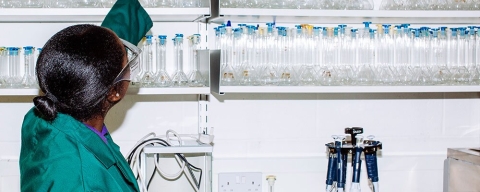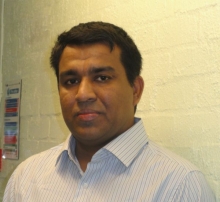
Showing content for section Overview
Overview
Turn your ambition into the postgraduate qualification you need and open doors to an exciting career in biotechnology.
With the UK being Europe’s leading biotech hub and Portsmouth ranked third of all modern post-92 universities in the UK for research power, there’s no better time to study our Master’s in Biotechnology.
You’ll develop your understanding of molecular tools that are used to solve global issues, including the exploration of genetic engineering, bioinformatics, online biological databases, and tailor your studies and experiments to the areas of biotechnology that match your interests.
When you graduate, you’ll be in a strong position to succeed in many fields from industry and academia to research and development – with the opportunity to specialise later in your career.
Eligibility
This course accepts UK, EU, and International students.
Course highlights
- Prepare to work in industry, or academic environments, choosing subjects that match your aspirations
- Unpack a practical and a theoretical understanding of the molecular techniques used in the biotechnology sector
- Develop your practical skills using professional research equipment in the University's complex of over 30 laboratories
- Benefit from our world-renowned Centre for Enzyme Innovation where we're researching solutions to some of the most pressing global environmental problems
- Study modules in entrepreneurship, bioinformatics, and genetic engineering
- Access opportunities to build your business ideas through our Student start-up and Entrepreneurs in Residence
Explore MSc Biotechnology at Portsmouth
Discover how our MSc Biotechnology degree course will help you develop your understanding of molecular tools that are used to solve global issues.
Binuraj Menon: So this is the MSc Biotechnology course. This course is carried out in either part time or full time. If it's part-time, it's for two years and full-time, it's for one year.
Biotechnology is using biological substances or biomaterials and developing new technologies using those materials. The course covers a lot of different areas in biotechnology. So we have bioinformatics and omics. We have engineering animals. The students do genetic engineering of animals and bacteria, so the course is quite broad in that sense. But there is a skill and the experience they will have will make them more specialised in one particular area.
The facilities at the University of Portsmouth include the Enzyme Innovation Centre, so the students who are studying MSc Biotechnology will be placed over there.
Biotechnology is one of the fastest growing fields in UK and across the globe, so we are preparing students to take over these kind of jobs in the industry as well as in academia.
Biotechnology has got different spectra of areas. For example, agricultural biotechnology, marine biotechnology, pharmaceutical biotechnology. Students who complete the course can look for jobs in one of these sectors.
We have association with the business school here, and one part of the course is developing enterprise skills and how to invest time to think about a start up company in biotechnology. They will learn different skills as well.
We have a LinkedIn group where all the previous students and alumni are involved, so we are in touch with all of them and we could see them placed in bigger pharmaceutical companies and industry and even in academia, teaching and different areas of biotechnology. So that makes us quite proud.
Contact information
Contact AdmissionsEntry requirements
September 2026 / January 2027 start
- A second-class honours degree or equivalent in a relevant subject. Professional experience and other qualifications may be taken into consideration for applicants not meeting this requirement.
Please get in touch if you're not sure if your undergraduate subject is relevant to this degree.
Equivalent professional experience and/or qualifications will also be considered, such as previous study, employment, voluntary work and training courses, including courses and qualifications you didn't complete. Learn more about our Recognition of Prior Learning (RPL).
If you're applying as an international student with a non-UK degree, you’ll need to show you meet the UK entry requirements listed above.
To find out if your non-UK degree or other qualification is accepted, please visit our page for your country and view the UK equivalent of your qualification.
- English language proficiency at a minimum of IELTS band 6.5 with no component score below 5.5.
You do not need an IELTS or equivalent certification if:
- you have a UK degree
- you have a degree from a majority English speaking country (not taught by Distance Learning)
- you are a national of a majority English speaking country
Degrees taught solely in English from non-majority English speaking countries will be considered on a case by case basis. Find out more about our English language requirements.
If you do not meet the English language requirements yet, you can achieve the level you need by successfully completing a pre-sessional English programme before you start your course.
Ideal skills and qualities for this course
Ideally, we're looking for people who have studied, or have some subject knowledge of, biochemistry, genomics, cell biology, microbiology, immunology and biotechnology. You do not need to have studied these subjects to get a place on this degree, as we're flexible on our requirements.
Course costs and funding
Tuition fees (September 2026 / January 2027 start)
- Full time: £11,200
- Part time: £5,600 per year (may be subject to annual increase)
- Full time: £19,950
- Part time: £9,980 per year (may be subject to annual increase)
If you're an EU student you may be eligible to receive our EU Scholarship.
Explore how to fund your studies, including available scholarships and bursaries.
If you're a UK student, you may be eligible for a Government Postgraduate Master's Loan, which you can use to help with course fees and living costs.
Tuition fees terms and conditions
Funding your studies
Find out more how to fund your studies, including the scholarships and bursaries you could get. You can also find more about tuition fees and living costs, including what your tuition fees cover.
If you're a UK student, you may be eligible for a Government postgraduate loan, which you can use to help with course fees and living costs.
Applying from outside the UK? Find out about funding options for international students and our international student scholarships.
International students can apply for our January 2024 Faculty scholarship.
Loans, scholarships and bursaries
Browse funding such as the Government Postgraduate Loan, our scholarships for new and returning students, and subject specific loans.

Funding for international students
Learn more about sponsorships, scholarships and loans for students applying from outside of the UK.

Fees and funding for Master's courses
Explore Master's funding options, including loans, scholarships, bursaries and more.

Additional costs
These course-related costs aren't included in the tuition fees, so you'll need to budget for them when you plan your spending. Additional costs could include:
- Accommodation: Accommodation options and costs can be found on our accommodation pages.
- Recommended reading: You can borrow key texts from the library and if you choose to purchase these texts they may cost up to £60 each.
- General costs: Such as photocopying, memory sticks, printing charges, binding and specialist printing. We suggest budgeting £75 per year.
- Final project transport or accommodation: where necessary, which related to your research activities. The amount will depend on the project you choose.
Read more about tuition fees and living costs, including what your tuition fees cover.
Modules
Full-time
On this MSc Biotechnology course you'll study three core modules and two optional modules.
Core
You'll learn how recent advances in molecular biology are revolutionising biology and medicine. Genome sequencing allows accurate phylogenetic reconstruction and provides insight into the genetic basis for human diseases. Studying gene expression and epigenetic regulatory mechanisms on a genome-wide scale enables deeper understanding how gene expression is regulated. Bioinformatics, the computational analysis of these data, is highly relevant in biological and biomedical research, and in the development of personalised medicine. You'll attend computer workshops and learn skills for using software and online resources for sequence analysis, including an introduction to R script and unix command line.
You'll evaluate and synthesise existing data to design experiments to further scientific knowledge and be realistic in realising limitations and expectations. You'll identify your key transferable skills and prepare for the current labour market, particularly in preparing and presenting yourself through CVs and interview performance. You'll be provided with the laboratory and critical interpretation and employability skills, necessary to enable you to make informed career decisions and to be self-reflective, embrace new challenges and seize opportunities for career, personal and professional development.
You'll critically discuss the technology of exogenous protein expression and critique the applications of exogenously expressed proteins in biotechnology. These concepts will be reinforced and exemplified in a week-long laboratory practical concerning protein expression and purification. You'll also focus on emerging topics in Molecular Biotechnology and their potential scientific, societal and economic impacts.
Optional
You’ll gain hands-on practice evaluating opportunities, preparing business cases for investment and sharpening your entrepreneurial skills from self-direction to leadership. By considering startups and innovation roles across biotech contexts, you’ll develop plans to profitably translate inventions, IP and discoveries into products and services that responsibly serve society.
You'll look at how the advent of modern sequencing techniques has enhanced our knowledge of genomes and how DNA mutations can lead to many diseases and significantly advanced basic and biomedical research. Alongside this, you'll discover recent advances in gene therapy and discuss how gene editing technologies will significantly enhance our ability to treat genetic disorders in the future.
You'll develop an understanding of key microbial processes in the environment, microbial communities, and how these are interconnected. These concepts will be reinforced and exemplified in a laboratory practical concerning microbial community analysis, environmental analysis and experimental design.
You'll discuss current and emerging approaches to diagnostics and prognostics, clinical management, and treatment of various conditions aimed at developing an understanding of diseases at the molecular level. You'll also work in groups to master a systematic problem-solving approach to science, readying yourself for further study or a scientific career.
Part-time
In the first year of this part-time MSc Biotechnology course you'll study three optional modules.
Optional
You'll learn how recent advances in molecular biology are revolutionising biology and medicine. Genome sequencing allows accurate phylogenetic reconstruction and provides insight into the genetic basis for human diseases. Studying gene expression and epigenetic regulatory mechanisms on a genome-wide scale enables deeper understanding how gene expression is regulated. Bioinformatics, the computational analysis of these data, is highly relevant in biological and biomedical research, and in the development of personalised medicine. You'll attend computer workshops and learn skills for using software and online resources for sequence analysis, including an introduction to R script and unix command line.
You’ll gain hands-on practice evaluating opportunities, preparing business cases for investment and sharpening your entrepreneurial skills from self-direction to leadership. By considering startups and innovation roles across biotech contexts, you’ll develop plans to profitably translate inventions, IP and discoveries into products and services that responsibly serve society.
You'll look at how the advent of modern sequencing techniques has enhanced our knowledge of genomes and how DNA mutations can lead to many diseases and significantly advanced basic and biomedical research. Alongside this, you'll discover recent advances in gene therapy and discuss how gene editing technologies will significantly enhance our ability to treat genetic disorders in the future.
You'll develop an understanding of key microbial processes in the environment, microbial communities, and how these are interconnected. These concepts will be reinforced and exemplified in a laboratory practical concerning microbial community analysis, environmental analysis and experimental design.
You'll critically discuss the technology of exogenous protein expression and critique the applications of exogenously expressed proteins in biotechnology. These concepts will be reinforced and exemplified in a week-long laboratory practical concerning protein expression and purification. You'll also focus on emerging topics in Molecular Biotechnology and their potential scientific, societal and economic impacts.
You'll discuss current and emerging approaches to diagnostics and prognostics, clinical management, and treatment of various conditions aimed at developing an understanding of diseases at the molecular level. You'll also work in groups to master a systematic problem-solving approach to science, readying yourself for further study or a scientific career.
In the second year of this part-time MSc Biotechnology course you'll study one core module and one optional module.
Core
You'll evaluate and synthesise existing data to design experiments to further scientific knowledge and be realistic in realising limitations and expectations. You'll identify your key transferable skills and prepare for the current labour market, particularly in preparing and presenting yourself through CVs and interview performance. You'll be provided with the laboratory and critical interpretation and employability skills, necessary to enable you to make informed career decisions and to be self-reflective, embrace new challenges and seize opportunities for career, personal and professional development.
Optional
You'll learn how recent advances in molecular biology are revolutionising biology and medicine. Genome sequencing allows accurate phylogenetic reconstruction and provides insight into the genetic basis for human diseases. Studying gene expression and epigenetic regulatory mechanisms on a genome-wide scale enables deeper understanding how gene expression is regulated. Bioinformatics, the computational analysis of these data, is highly relevant in biological and biomedical research, and in the development of personalised medicine. You'll attend computer workshops and learn skills for using software and online resources for sequence analysis, including an introduction to R script and unix command line.
You’ll gain hands-on practice evaluating opportunities, preparing business cases for investment and sharpening your entrepreneurial skills from self-direction to leadership. By considering startups and innovation roles across biotech contexts, you’ll develop plans to profitably translate inventions, IP and discoveries into products and services that responsibly serve society.
You'll look at how the advent of modern sequencing techniques has enhanced our knowledge of genomes and how DNA mutations can lead to many diseases and significantly advanced basic and biomedical research. Alongside this, you'll discover recent advances in gene therapy and discuss how gene editing technologies will significantly enhance our ability to treat genetic disorders in the future.
You'll develop an understanding of key microbial processes in the environment, microbial communities, and how these are interconnected. These concepts will be reinforced and exemplified in a laboratory practical concerning microbial community analysis, environmental analysis and experimental design.
You'll critically discuss the technology of exogenous protein expression and critique the applications of exogenously expressed proteins in biotechnology. These concepts will be reinforced and exemplified in a week-long laboratory practical concerning protein expression and purification. You'll also focus on emerging topics in Molecular Biotechnology and their potential scientific, societal and economic impacts.
You'll discuss current and emerging approaches to diagnostics and prognostics, clinical management, and treatment of various conditions aimed at developing an understanding of diseases at the molecular level. You'll also work in groups to master a systematic problem-solving approach to science, readying yourself for further study or a scientific career.
Changes to course content
We use the best and most current research and professional practice alongside feedback from our students to make sure course content is relevant to your future career or further studies.
Therefore, some course content may change over time to reflect changes in the discipline or industry. If a module doesn't run, we'll let you know as soon as possible and help you choose an alternative module.
Research centres and facilities
European Xenopus Resource Centre (EXRC)
Discover the world’s largest Xenopus research facility and access different Xenopus specific resources, including antibodies, wild-type strains, DNA resources and egg extracts.

Centre for Enzyme Innovation
At the Centre for Enzyme Innovation, we are working to solve one of the most pressing environmental issues facing our planet.

Biophysical laboratories
Use professional-standard equipment to explore how the structures and functions of molecules change under different conditions.

Sequencing and Bioinformatics Group laboratory
Discover ways to analyse nanopore sequencing data and other next-generation sequencing platforms in our Sequencing and Bioinformatics laboratory.

How you'll spend your time
We recognise that you'll probably be juggling more demands when you do your Master's degree, as you may be working or you may have family responsibilities.
We'll give you as much indication here as we can of how much time you'll need to be on campus and how many hours you can expect to spend in self-directed study, but please note that these indications are always subject to change. You should receive your full timetable several weeks before you start with us.
It is our expectation that all international students will join us here on campus in Portsmouth.
Course structure
This Master’s degree will take:
- 1 year (full-time study)
- 2 years (part-time study)
You can expect:
- 37 hours of study time every week, including independent study and teaching, if you study full-time, or 18 hours each week if you study part-time.
- Between February and June, full-time students are expected to be on campus Monday–Friday to complete project work.
Teaching
Master's study is deeper and more specialised than an undergraduate degree. This means you'll focus on something that really matters to you and your career as you work closely with academics committed to the subject.
You'll spend more time in independent study and research than you did for your undergraduate degree, but the majority of your teaching time will be in-person and face-to-face.
Teaching methods
Teaching methods on this course include:
- lectures
- seminars
- worships
- practical work
Assessment
You'll be assessed through:
- written exams
- practical work
- problem solving
- presentations
- essay
- project work
You’ll be able to test your skills and knowledge informally before you do assessments that count towards your final mark.
You can get feedback on all practice and formal assessments so you can improve in the future.
Term dates
September start
The Master's academic year runs from September to the following September. There are breaks at Christmas and Easter. Over the summer you'll be writing your project / dissertation.
January start
Courses that start in January have the same amount of teaching as September-start courses, and run from January to the following January. There are breaks at Christmas, Easter and in the summer. In the last few months you’ll be writing your project / dissertation.

Joining us as an international student
You'll feel at home in our international community and our diverse city. You'll be joining over 5,000 international students from more than 150 countries who are studying with us.
Learn more about international student life and how we can help you with visas, applications, arrival and settling in.
Career development
Careers this Master’s prepares you for
This Master’s degree will help you to specialise in biotechnology and build your career in a variety of companies, including innovative start-ups and global corporations. You could also decide to start your own business, which we can support you with.
Once you graduate from this MSc Biotechnology degree, you’ll have a broad understanding of the ongoing development of life-improving technologies, strategies, and products used in the biotechnology sector. You'll have the practical skills to operate successfully in this pioneering field, or you could proceed to a research degree.
Graduates of this course have gone into roles such as:
- research scientist
- business associate
- sales representative
- forensic interpretations team leader
- molecular pathologist
- bone densitometry technician
- data analyst
- clinical trials assistant
- account executive
Graduates of this course have gone on to work for companies such as:
- Cellmark Ltd
- Portsmouth Trust NHS
- Publicis Health
- Eli Lilly
Career outcomes shown are sourced from the latest available graduate outcome surveys. The data shows career outcomes at 15 months after graduation.
Startup support
If you're interested in starting your own business, our student enterprise team will be on hand to give you help, support and advice. You can even access specialist support from our Entrepreneurs in Residence to help develop your business ideas.
Career planning
During your course you'll have expert career support from your tutors and our Careers and Employability Centre – which you can access for up to 5 years after you graduate.

You'll benefit from:
- Networking events
- Applied projects with employers
- 1-to-1 appointments
- CV and cover letter advice
- Interview preparation and practice
- Workshops to enhance your employability skills
- Recruitment events including the Student and Graduate Opportunities Fair
- Support starting your own business
Supporting you
Master's study is more focused on independent learning than undergraduate study, but you'll get lots of support via video, phone and face-to-face from teaching and support staff to enhance your learning experience and help you succeed. You can build your personalised network of support from the following people and services:
Types of support
Your personal tutor helps you make the transition to postgraduate study and gives you academic and personal support throughout your Master's.
As well as regular scheduled meetings with your personal tutor, they're also available at set times during the week if you want to chat with them about anything that can't wait until your next meeting.
You'll have help from a team of faculty learning support tutors. They can help you improve and develop your academic skills and support you in any area of your study.
They can help with:
- improving your academic writing (for example, essays, reports, dissertations)
- understanding and using assignment feedback
- managing your time and workload
- revision and exam techniques
During term time, Faculty Academic Skills Tutors (AST) are available for bookable 1-to-1 sessions, small group sessions and online sessions. These sessions are tailored to your needs.
Support is available for skills including:
- University study
- Getting into the right study mindset
- Note-taking and note-making skills
- Referencing
- Presentation skills
- Time management, planning, and goal setting
- Critical thinking
- Avoiding plagiarism
If you have a disability or need extra support, our Disability Advice team will give you help, support and advice.
You can get personal, emotional and mental health support from Student Wellbeing, in person and online. This includes 1–2–1 support as well as courses and workshops that help you better manage stress, anxiety or depression.
If you require extra support because of a disability or additional learning need our specialist team can help you.
They'll help you to:
- discuss and agree on reasonable adjustments
- liaise with other University services and facilities, such as the library
- access specialist study skills and strategies tutors, and assistive technology tutors, on a 1-to-1 basis or in groups
- liaise with external services
Library staff are available in person or by email, phone or online chat to help you make the most of the University’s library resources. You can also request one-to-one appointments and get support from the faculty librarian for science.
The library is open 24 hours a day, every day, in term time.
If English isn't your first language, you can do one of our English language courses to improve your written and spoken English language skills before starting your degree. Once you're here, you can take part in our free In-Sessional English (ISE) programme to improve your English further.
The Maths Café offers free advice and assistance with mathematical skills in a friendly, informal environment. You can come to our daily drop-in sessions, develop your maths skills at a workshop or use our online resources.
How to apply
Unlike undergraduate applications, which go through UCAS, applications for this Master's course are made directly to us.
There's no deadline for applications to this course. We accept applications right up until the start dates in September and January, as long as there are places available. If you wait until your start month to apply, you may find that the course is full.
If you're applying as an international student, remember that you'll need to leave plenty of time to get your visa organised.
You can find more advice about applying in our Master's application checklist. International students and current students and recent graduates of the University of Portsmouth also have some different application options, which are detailed below.
Extra information for international students
If you're an international student, you can apply directly to us using the same application form as UK students.
You could also get an agent to help with your application. Check your country page for details of agents in your region. To find out what to include in your application, head to the how to apply page of our international students section.
If you don’t meet the English language requirements for this course yet, you can achieve the level you need by successfully completing a pre-sessional English programme before you start your course.
Ready to apply?
Start this course in September 2026
Apply now (Full-time) – 1 year
Apply now (Part-time) – 2 years
Start this course in January 2027
I'm a current Portsmouth student, or a recent Portsmouth graduate
If you're currently in your final year of study at Portsmouth, or you graduated since July 2024, you're eligible to make a fast track application. You'll have:
- a shorter application form to complete
- access to the 20% Alumni fee discount
- a guaranteed conditional offer, for most Master's courses
After you apply
Once we receive your application, we may ask you for further information. We will then either make you an offer or suggest alternatives if your application is unsuccessful.
You'll usually get a decision within 10 working days, so you shouldn't have to wait too long. Some courses have an interview stage – we'll let you know if you need to prepare for one.
Learn more about how we assess your application.
Admissions terms and conditions
When you accept an offer to study at the University of Portsmouth, you also agree to abide by our Student Contract (which includes the University's relevant policies, rules and regulations). You should read and consider these before you apply.




